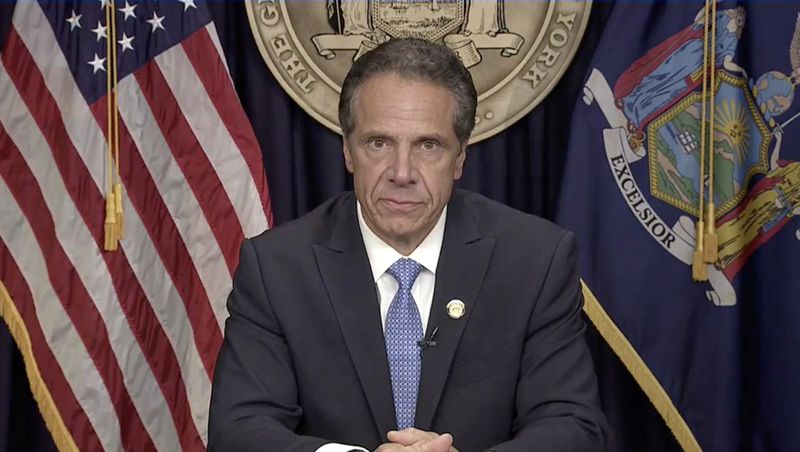By Jonathan Allen and Joseph Ax
NEW YORK (Reuters) -Lawmakers in the New York Assembly will suspend their impeachment investigation of Governor Andrew Cuomo in light of his promise to step down from office over sexual harassment complaints, Speaker Carl Heastie said in a statement on Friday.
The Assembly, controlled by Cuomo's fellow Democrats, opened the impeachment investigation in March after at least two women who formerly worked for the governor went public with complaints that Cuomo had sexually harassed them. The decision means that Cuomo will not face the prospect of a ban from seeking elected office again in New York.
A damning report released this month by New York Attorney General Letitia James, also a Democrat, concluded Cuomo had broken state and federal law by kissing, groping or making lewd comments to at least 11 women, including aides and a state trooper.
Cuomo said in a widely seen video broadcast on Tuesday he would resign after a decade running the state and leave office in two weeks. He has denied harassing anyone, though he has acknowledged making some women uncomfortable by engaging in what he characterized as well-intentioned efforts to show affection, which he attributed in part to his Italian-American upbringing.
Heastie said the impeachment inquiry was no longer needed since its purpose was "to determine whether Governor Cuomo should remain in office."
He also said lawmakers have been advised by legal counsel that the state's constitution does not allow the legislature to impeach an elected official who is no longer in office; many observers have noted the constitution does not explicitly address that scenario.
Lindsey Boylan, a former aide who was the first woman to accuse Cuomo publicly in December, called the Assembly' decision an "unjust cop out."
"The public deserves to know the extent of the Governor's misdeeds and possible crimes," she wrote in a statement shared on social media.
Some lawmakers also objected, arguing that Cuomo can and should still be impeached even after leaving office. Assemblyman Ron Kim, a Democrat and a frequent Cuomo critic, said he would be releasing a legal memo explaining why impeachment is allowed under the law.
If impeached in the Assembly, Cuomo would have faced a trial in the state Senate, which also has a Democratic majority. A conviction would permit lawmakers to bar Cuomo from ever holding public office in New York again.
Prior to his resignation, Cuomo appeared almost certain to be impeached and ousted from office, as Democratic legislators abandoned him following the report from Attorney General Letitia James' office.
The impeachment probe was not limited to the harassment allegations.
Investigators were also examining why the Cuomo administration withheld data showing the true extent of nursing home deaths during the coronavirus pandemic as well as whether Cuomo improperly used state resources in penning a published memoir.
While incomplete, the inquiry had gathered enough evidence to likely result in impeachment had Cuomo not stepped down, Heastie said. The evidence will be turned over to the "relevant investigatory authorities," Heastie said, though he did not indicate whether the findings would be made public, as some lawmakers have proposed.
Cuomo has denied any wrongdoing with regard to nursing home data as well as his book.
He still faces potential criminal investigations from several district attorneys' offices.
A former assistant, Brittany Commisso, filed a criminal complaint against Cuomo with the Albany County sheriff's office last week, alleging that the governor groped her breast at the Executive Mansion in November.

Cuomo has denied fondling her, and his private lawyer has sought to discredit her story.
Lieutenant Governor Kathy Hochul, a Democrat, will become the state's first female governor when she takes over for Cuomo. She announced on Thursday she intends to run for a full term in 2022.